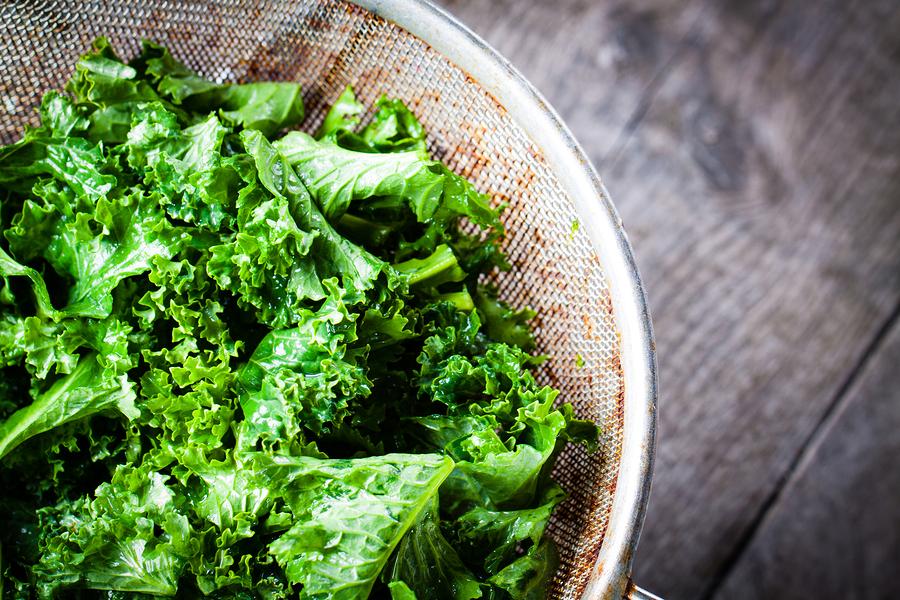By now you have more than likely heard the hype surrounding kale as an amazingly nutritious food. Many foodies and nutrition gurus have even gone as far as to label kale as a superfood!
Maybe you have written this off as just another health food fad that will soon pass. However, if you take a closer look at this leafy green powerhouse of nutrients then you might soon find yourself becoming a kale convert!
Kale comes from the same family of cruciferous vegetables as cabbage, cauliflower, Brussels sprouts and broccoli. There are several different varieties to choose from, such as purple kale or curly kale. It is extremely low in fat and calories, whilst bursting with vitamins and minerals!
As it is such a versatile food, it is simple to include kale in your meal, regardless of the time of day. You can add a handful or two for a healthy boost to your breakfast, lunch and dinner. And, kale isn’t as expensive as you might think. Whether you believe kale to be deserving of the superfood title or not, there is no disputing that it is actually one of the most nutrient dense foods on the planet.
So what is it about kale that gives it the superfood title?
What’s Inside?
Just one cup of raw kale (approximately 65 grams) contains a massive 206% of your recommended daily allowance (RDA) of vitamin A! And, the exciting vitamin count does not stop there! The same single cup of raw kale contains over 600% of your RDA of vitamin K, more than 100% of your RDA of vitamin C and 26% of your RDA of manganese.
Kale also contains beneficial amounts of vitamin B6, calcium, copper, potassium, magnesium, thiamin, riboflavin, niacin, iron and phosphorous!
The antioxidants found within kale are one of the biggest reasons to get excited about this leafy green. For those of who who don’t know, antioxidants are compounds that help to combat the damage caused by free radicals in the body. This means that when you include foods in your diet that are high in antioxidants, you are much better enabling your body to stay healthy and fight disease!
Strong, Healthy Bones!
Well, first of all (and this is our favourite reason of course), kale can help you to build strong, healthy bones. As we know, calcium is essential for healthy bones. This is why people will often tell you to drink your milk if you want strong bones. However, kale actually contains more calcium then milk!
It is important that you provide your bones with a wealth of different minerals if they are to stay healthy and kale is a great choice for doing so. This is largely because kale is rich in vitamin K, which the body needs to keep several essential functions in the body working properly – including the maintenance of your bones!
Combatting Inflammation
Inflammation in the body can contribute to certain orthopedic problems, as well as a long list of other health problems. Fortunately, there are several dietary ways to help combat inflammation.
Including kale in your diet is one of those ways as it contains an abundance of phytonutrients. Furthermore, when you are trying to tackle inflammation in the body it is important to consume an ample amount of omega-3 fatty acids. Just one cup of cooked kale provides 10% of your recommended daily allowance of omega-3, which demonstrates how including it regularly can be a big help!
Eye Health
It is thought that your eyesight can also benefit when you regularly eat kale. This is because this powerful green food contains both zeaxanthin and lutein. These carotenoids are known to help to prevent damage to the eyes from overexposure to light. Studies have found that people who eat a diet rich in lutein are up to 22% less likely to develop cataracts than those who do not.
These fantastic reasons are just the tip of the iceberg when it comes to considering the benefits of eating kale. Give it a try for yourself and you could soon be enjoying the health advantages of doing so. If after reading this article you think that you might like to give kale a go, then I suggest you get started by adding it to your morning smoothie to get an idea of the taste!
A modest handful will be enough to boost the nutrient count of your smoothie, whilst also providing an interesting colour and flavour. If you do not enjoy the flavour then you might prefer to add kale to soups and stews, where the taste will be overpowered by other more dominant flavours. However, if you do love the taste then you might like to try sautéing some kale to accompany your lunch, or add it raw into a salad.
Regardless of how you enjoy your kale, try to enjoy it often for the maximum health benefits!
References
1) http://www.medicaldaily.com/6-kale-health-benefits-will-help-you-live-longer-and-live-well-276566
2) https://authoritynutrition.com/10-proven-benefits-of-kale/
Related Posts
Cigarettes May Inhibit Inflammation Treatments
Axial spondyloarthritis, also known as AxSpa, is a chronic…








